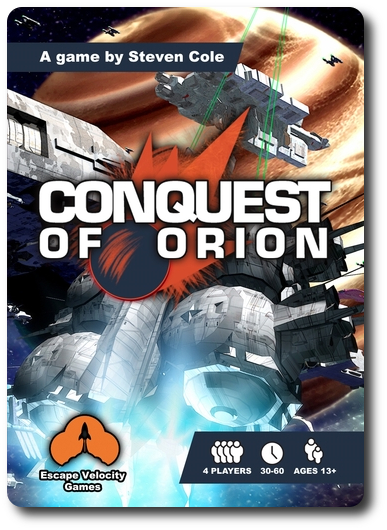
The Basics:
- For ages 7 and up (publisher suggests 13+)
- For 4 players (2 teams of 2-players each)
- Approximately 30 minutes to complete
Geek Skills:
- Active Listening & Communication
- Counting & Math
- Logical & Critical Decision Making
- Reading
- Pattern/Color Matching
- Strategy & Tactics
- Cooperative & Team Play
- Hand/Resource Management
Learning Curve:
- Child – Easy
- Adult – Easy
Theme & Narrative:
- Form an alliance to rule the galaxy
Endorsements:
- Gamer Geek rejected!
- Parent Geek approved!
- Child Geek approved!
Overview
Mankind can finally travel to distant stars. It was the hope of many that this would be the dawning of a new age of enlightenment and peace. But this dream was not meant to be. War and greed have followed mankind on their journey into the heavens and now distant galaxies are the new battleground. To protect your way of life and further your ambitions, you and a fellow comrade lead your people into war.
Conquest of Orion, designed by Steven Cole and published by Escape Velocity Games, is comprised of 54 cards and 1 First Player token. The artwork by Michael Parla and Gary Simpson is excellent and does a great job of capturing the places and weapons of war used in the game. Not included with the game, but necessary to play, is a pen or pencil and something to write on to keep track of teams’ scores.
A Tour of Orion
There are 5 different types of cards in the game. Each type thematically represents different aspects of life and industry in the Orion galaxy the players are attempting to control. They are summarized here.
Planet Cards
The Planet cards represent different locations found in the Orion galaxy. Until they are colonized and contribute to the economics of the galaxy, they are just floating spheres or rock, ice, and water. But make no mistake, even a floating ice ball with nothing living on it has strategic importance.
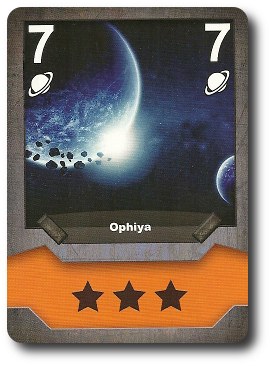
Colony Cards
The Colony cards represent the brave families who risk it all by going to a new world to make it their home. Colony cards inhabit Planet cards, but are not much use to anyone until they start producing goods. While many of the colonists are searching for a new way of life, they are really nothing more than pieces on the board used to further your goals.
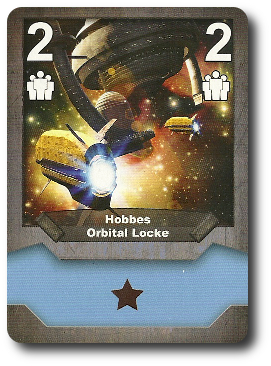
Industry Cards
The Industry cards represent giant factories, farms, medical labs, and research facilities that are run by the colonists on various planets. While the colonists may make a living from the goods their factories produce, these represent a means to mass produce weapons, armor, and warships to strike at your enemies.
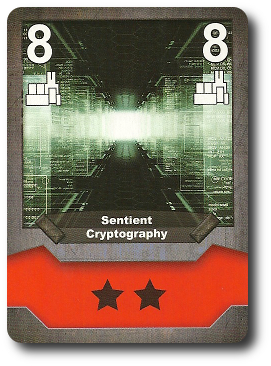
Ship Cards
Capable of flying through a planet’s atmosphere and the vacuum of space, ships connect the planets in the Orion galaxy. Some ships are designed for cargo and ferrying people, while others are built only for war. All Ship cards have a special affect. Ship effects are triggered as soon as they come into play and continue to be triggered after each additional card is played in the current conflict or war, where applicable.
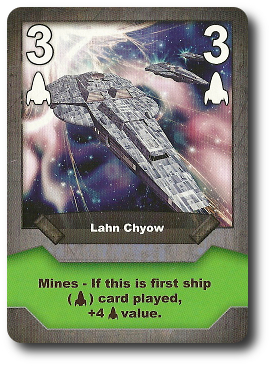
Leader Cards
Guiding their people through troubling times, the Leaders take on the heavy responsibility of running the galaxy. All Leader cards have a special ability that is used for the round they are active. The Leader card’s affect is triggered when the game condition allows. While each Leader may appear publicly as an independent individual, privately they answer only to you.
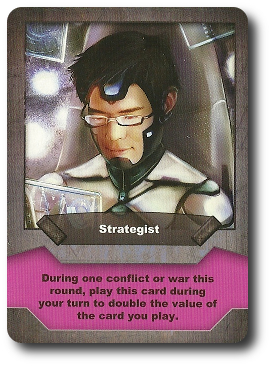
Quick Word on Team Play
Conquest of Orion requires players to play as teams. This is a cooperative game, but the team members cannot openly discuss in any detail what they plan to do or what cards they have. Table talk is allowed and even encouraged (players are not expected to play the game in silence), but discussing cards or strategies is strictly forbidden. Players must listen to what is not being said or how things are being said in order to secretly communicate. They must also listen to the opposing team in hopes of finding out what cards they will play.
Game Set Up
To set up the game, separate the players into teams of 2. Have each team member sit opposite of each other. When seated, a player should have their opponents to their left and right, with their team member sitting directly opposite of them.
Second, find and put in a pile all the Planet, Colony, Industry, and Ship cards. Shuffle this pile to form what is referred to as the “System Deck”.
Third, remove 4 cards from the System Deck. Leave these cards face-down and set them aside. They are not used, but are still in the game.
Fourth, deal 10 cards to each player from the System Deck. Players should pick up their cards and keep them hidden from all other players until played. Place the System Deck off to one side for now.
Fifth, find the “Politician” Leader card and place it face-up in the middle of the playing area. Shuffle the remaining Leader cards and deal 2 to each player, face-down. The remaining Leader card not dealt is placed face-up next to the “Politician” Leader card.
Sixth, determine who will be the first player. If this is the game’s first round, the player with the “1” Planet card is automatically the first player. If the “1” Planet card has not been dealt, the lowest numbered Planet card is the first player. Give the first player the First Player token.
Seventh, each player now selects 1 Leader card. Starting with the first player, players can select to be either one of the face-up Leader cards in the middle of the gaming area or one of their 2 Leader cards they were dealt. If the player selects a Leader card from the middle of the game playing area, they must replace it with one of their Leader cards. When the Leader card is selected, it’s placed face-up in front of the player. All Leader cards not selected are collected and set aside for now.
Note: The initial game set up is repeated 3 times in the game.
That’s it for game set up. Time to win Orion.
A Galaxy at War
Conquest of Orion is played in turns and rounds for a total of 3 rounds. Each round consists of 10 conflicts and possible wars. Thematically speaking, each conflict is like a small skirmish which could ignite a larger battle. A typical game round is summarized here.
Step 1: Play 1 Card
Players will now play 1 card from their hand, starting with the first player and going clockwise around the table. When played, the card is placed face-up in front of the player. Any card in the player’s hand can be played, but the player MUST play a card type that has not been played in the current conflict.
For example, if the opponent to their left just played a Planet card, the player must play a Colony or Industry card if possible. If the player does not have another card type to play, they can play any card they like as normal. The one exception to this rule is the Ship card which can be played at anytime, regardless of how many Ship cards have been played in the current conflict.
Step 2: Determine Conflict Winner
The conflict is now over and it’s time to determine who won.
- If 1 or more Ship cards have been played, the Ship card with the highest value (after modifiers) wins the conflict
- If no Ship cards have been played, the Planet, Colony, or Industry card with the highest value (after modifiers) wins the conflict
Note: If 2 or more players tie for highest value card, war will be declared during step 3.
Step 3: Wage War or Collect Spoils
The player who wins the conflict can now decide the fate of the galaxy.
Collect Spoils
If the winner of the conflict likes, they can simply collect the 4 cards played during the conflict and place them in a pile next to them, face-down. The galaxy is uneasy, but war is not declared. Onward to step 4.
Declare War
If the player who won the conflict likes, they can declare war and watch the galaxy burn. If 2 or more players tie for highest value card during step 2, war is declared by default regardless of how anyone feels about it. War is waged and completed as follows.
- Flip all the current cards in the conflict face-down. Push them to the middle of the playing area. These cards are no longer in the conflict and are not affected by any card abilities, but they will be won by the player who wins the war.
- The player who began the conflict now plays 1 card from their hand, but unlike a conflict, what cards a player can play are much more restrictive. Ship cards MUST be played if possible. If a player cannot play a Ship card, any other card in their hand may be played.
The war is now over and the winner of the war is determined the same way as the conflict.
- If 1 or more Ship cards have been played, the Ship card with the highest value (after modifiers) wins the war
- If no Ship cards have been played, the Planet, Colony, or Industry card with the highest value (after modifiers) wins the war
Note: If 2 or more players tie for highest value card again, a second war will be declared and is played out the same way as noted above. The war continues until there is only 1 winner.
The winner collects all the cards played during the war and all the face-down cards played during the conflict and previous wars. These cards are placed next to the player, face-down.
Step 4: Repeat
Steps 1, 2, and 3 are now repeated until players have played all their cards in their hand. Once the last cards are played, the round ends. The first player never changes during the round.
Calculating Victory
At the end of every round, points are counted and scores are calculated. Each player will take the cards collected during conflicts and wars and separate them by type. All Ship cards are set aside and are not used when determining the player’s score. Once each player has their cards organized, they combine them with their team member’s cards.
Team members now take their cards and organize them into complete system. A complete system is made up of 1 Planet, 1 Colony, and 1 Industry card. The number value on the cards is ignored, but players will want to pay special attention to the number of star icons. Each Planet, Colony, and Industry card will have 1, 2, or 3 stars on it. These stars count as points, but ONLY if they are part of a complete system! Any Planet, Colony, and Industry card not part of a complete system are ignored.
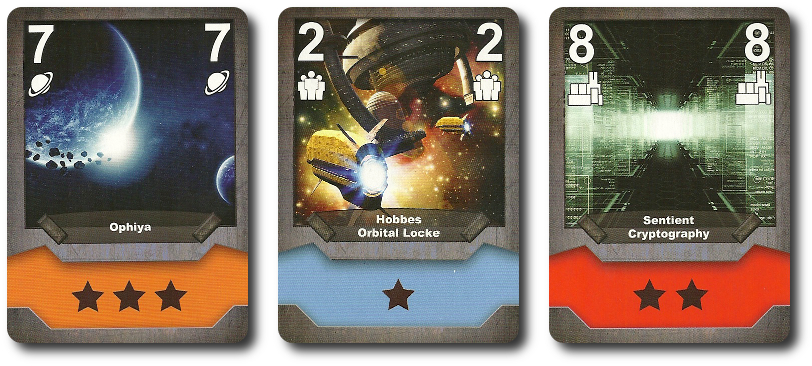
Example: A complete system worth 6 points
Once all the teams are done organizing their complete systems, they count the stars. Each star is worth 1 point. If there are any bonus points provided by Leader cards, they are now added. The total for each team is recorded for the round.
The Next Round and Ending the Game
A new round begins using the same steps noted in the game set up, but teams remain the same. After the third round has been completed and scores calculated, the wining team is determined. The team with the most number of points goes on to rule Orion and wins the game. Ties are broken by total points earned on the second round.
Game Variant
A 3-player game variant is in the works, but is not yet available. The alternative rules for a 3-player game will be hosted, according to the publisher’s website and the game’s rule book, on the game’s web page.
To learn more about Conquest of Orion, visit the game’s web page.
Final Word
The hardest aspect of this game for the Child Geeks was the “not openly talking about strategy and cards” rule for their teams. Game play wise, they fully understood how to play Conquest of Orion after I explained it. They demonstrated good use of hand management and notably went out of their way to collect cards to create a complete system. Their use of the Ship cards was also very good, but the Leader cards were often forgotten. My theory is that the Leader cards are not always up front in the player’s face, so they are easily forgotten. According to one Child Geek, “Neat game! It’s like War in space!” Another Child Geek said, “I don’t understand how I’m supposed to talk and not talk to my team member, but I really like this game.” In fact, the Child Geeks liked the game so much, that they all voted to approve Conquest of Orion.
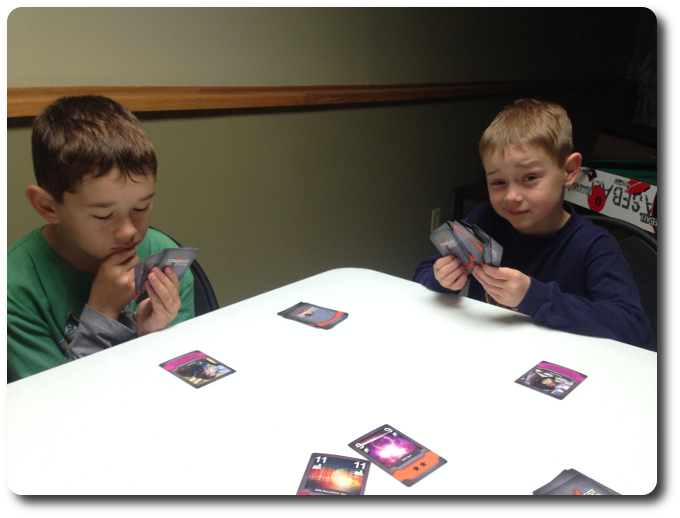
My partner thinks about his next play while my opponent give me a “Seriously?” look…
The Parent Geeks also enjoyed the game, especially the casual game players and the non-gamers. For the non-gamers, the space and Sci Fi theme wasn’t all that interesting, but the game’s theme is more or less in the background. Which is to say, the game’s theme and narrative only serve as a “pitch” to get you to the table. From thereon out, it’s not in the forefront enough to suggest that players are waging galactic combat. This was noted by one Parent Geek who didn’t seem to think it mattered. According to him, “I like how the game plays and how you have to work together, but I don’t really care if it’s about space or not.” Another Parent Geek said, “I’m supper happy about this game. It’s one I can play with my family and my kids instead of War!” All the Parent Geeks voted to approve Conquest of Orion.
After just one game, a Gamer Geek told me, “This is War with teams.” Which, to the gaming elitists, was not much fun. They did like how you scored points only after collecting complete systems, but this felt like set collecting, which was nothing new. One Gamer Geek said, “What we have here is a game in two parts. One part has some excellent ideas. I like how you have to play as teams, how you score points, how you have to manage your cards, and the importance of timing with the Ship cards. What I don’t like is that this is just War with teams, basic set collecting, and tacked on affects that feel like they were added in hopes of making the game play more interesting. Taken as a whole, this is not a game I would play with my fellow gaming elitists.” All the Gamer Geeks felt the same, finding Conquest of Orion to be a game that felt like old ideas mashed together to create something that wasn’t that interesting.
As for me, I rather enjoyed Conquest of Orion and thought it was a neat spin on some classic card game elements. Yes, I do agree there isn’t anything really unique here, but I enjoy the mashup. As far as the game’s theme goes, I could take it or leave it, but I can’t imagine the game being of any interest to the Child Geeks without it. One Parent Geek suggested that the game wouldn’t be a game without some sort of “war theme” wrapped around the game’s play since you are technically winning hands by playing War. I cannot disagree.
The only aspect of the game that I do not care for is the restrictive team play. I’m sure there is a reason, but I don’t see why you can’t play this game as an “everyone versus everyone” experience. If I had to guess, it’s because you need a lot of cards to score points and the number of points would be pretty small each round if two people weren’t contributing to the whole. Or, worse yet, you’d get a few players who score big points and the other player’s have no chance of catching up. That’s pretty frustrating.
So, who is Conquest of Orion for? Certainly people who like to play card games, but not for the card game purest. I don’t think Conquest of Orion would appeal to a player who plays the standard card games because of its theme and its easy game play. That being said, anyone who likes the idea of a standard card game, but finds them boring because they lack any theme and the cards are uninteresting to look at, will love Conquest of Orion. If this sounds like you, do give Conquest of Orion a try.
This game was given to Father Geek as a review copy. Father Geek was not paid, bribed, wined, dined, or threatened in vain hopes of influencing this review. Such is the statuesque and legendary integrity of Father Geek.



